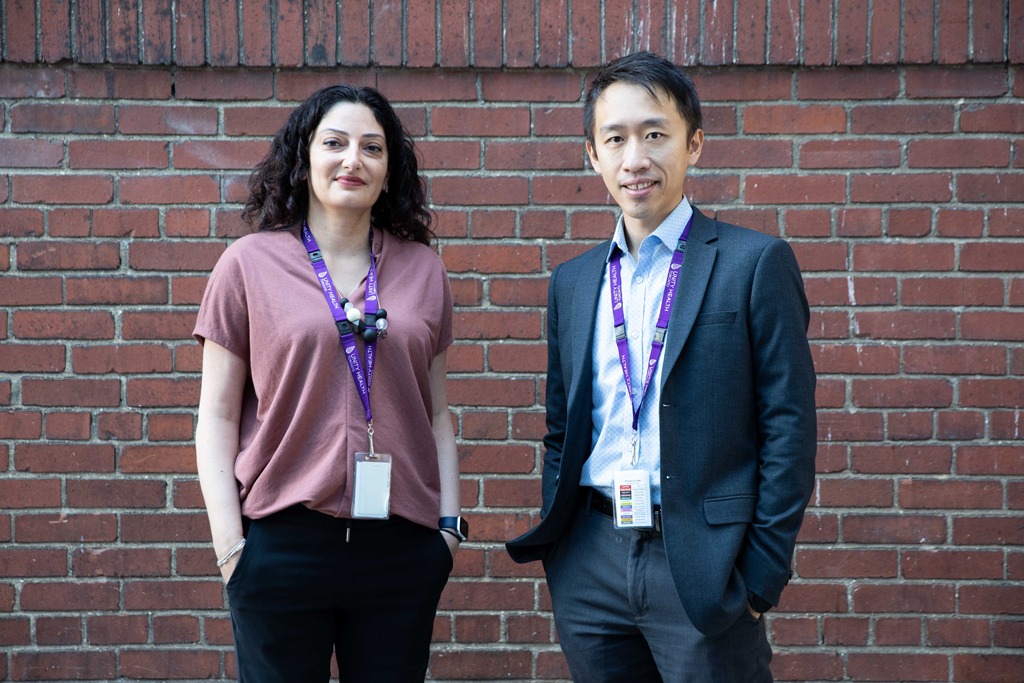Here’s how we bring inventions to life

Behind every commercialized research project is a small but mighty team of experts who help transform ideas into products that can make a difference in patients’ lives.
Some Unity Health-grown innovations have led to the creation of spin-off companies with products that are already on the market. The OR Blackbox, a technology that monitors all aspects of a surgery to enhance patient safety, was commercialized by Surgical Safety Solutions, and is now in hospitals around the world. BlueDot has developed a first-of-its-kind, global biothreat intelligence platform, which helps governments and businesses detect, assess, and respond to a growing number of outbreaks appearing around the world is another example. Other spin-off companies have products in the development pipeline, such as Fibrocor Therapeutics, which is pioneering the development of novel therapeutic agents for the prevention, treatment and potentially the reversal of diseases characterized by fibrosis.
The Research Commercialization team consults on as many as 20 new inventions annually from Unity Health researchers. Comprised of Dennis Ng, Research Commercialization Manager, and Samar Saneinejad, Senior Director of Strategy and Commercialization for Research, the team evaluates projects based on their commercial potential and helps them move to the next step on an often complex and lengthy path to the market.
To determine if an invention can be commercialized, they look at its novelty, the importance of the issue it can address and which resources are needed to develop it further. Then, they analyze the landscape to understand whether similar products exist and how competitive the field is. Finally, they evaluate the risk and any potential challenges associated with commercialization which could lead to difficulties in patenting or protecting the invention.
“This is a dynamic process where we meet with innovators to discuss their goals and see how we can guide and support,” Ng said.
Once it’s determined that a project has commercialization potential, Ng and Saneinejad provide support to the innovator throughout the process – from helping protect the intellectual property by filing patents, to looking for licensing opportunities, to supporting the team in finding funding, potential investors or industry partners. If the innovators are interested in entrepreneurship, the Commercialization team can also connect them with entrepreneurship programs, incubators and accelerators that offer support and guidance.
“Academic funding can only support a project to a certain point, so you need additional funding beyond typical research grants to commercialize your invention” Ng said. “We can help identify commercialization-focused funding opportunities which researchers may not be familiar with.”
Unity Health projects that are currently on the path to commercialization include newly discovered molecules that can be used to make therapies, medical devices to enhance patient care, and digital health technologies that support patients and providers.
For Dr. João Rezende-Neto, a trauma surgeon and researcher at St. Michael’s Hospital, the expertise offered by the Research Commercialization Team was crucial in bringing a surgical device he had invented to patients. The product helps facilitate the proper closure of the abdomen after surgery.
When the initial plan to commercialize the innovation fell through, Dr. Rezende-Neto depended on the Commercialization team to help him come up with a new approach.
“The process was very smooth,” he said. “Most of us in the medical field don’t have business training and we don’t know how these things work – the Commercialization team does and they can help us.”
The device, AbClo, was eventually commercialized by InventoRR-MD, a company co-founded by Dr. Rezende-Neto that specializes in trauma and general surgery devices. A home-grown St. Michael’s company, InventoRR-MD incubated in the Biomedical Zone, which is a partnership between Unity Health and Toronto Metropolitan University. Now, AbClo is Health Canada and FDA-approved, and hospitals across Canada and the United States are using it.
For researchers and clinicians with innovative ideas, like Dr. Rezende-Neto, Ng recommends they reach out to the Commercialization team as early as they can. If it’s too early in the development of the innovation, the journey doesn’t stop there – Ng says the team can provide helpful suggestions like exploring funding sources and making introductions to commercialization experts for advice. For Ng and Saneinejad, building relationships with innovators early in their journey is important as many important connections can be made along the way.
Ultimately, their goal is to support the research enterprise and the innovators that power it.
“Having this team in the institution creates a trusting bond,” Dr. Rezende-Neto said. “They give you peace of mind.”
By: Ana Gajic
